Add this eBook to your basket to receive access to all 90 records. Our indexes include entries for the spelling pollen. In the period you have requested, we have the following 90 records (displaying 1 to 10): These sample scans are from the original record. You will get scans of the full pages or articles where the surname you searched for has been found. Your web browser may prevent the sample windows from opening; in this case please change your browser settings to allow pop-up windows from this site. Militia in Carhampton hundred, Somerset
(1569)
A muster of the ablemen, gunners, light horsemen, pikemen, archers and billmen available from this hundred, compiled by sir Hugh Paulet, sir Maurice Barkeley, sir Ralph Hopton and John Horner in answer to a royal commission of the 11th year of queen Elizabeth. The returns are arranged by tithing. The hundred consisted of the parishes of Carhampton, Culbone (Kilner), Cutcombe, (the market town of) Dunster, Exford, Luckham (Luccombe), Luxborough, (the seaport and market town of) Minehead, Oare, Porlock, Selworthy, Stoke Pero, Timberscombe, Treborough, Withycombe and Wootton Courtney. (The sample shown is from the return for the borough of Axbridge) | Sample scan, click to enlarge
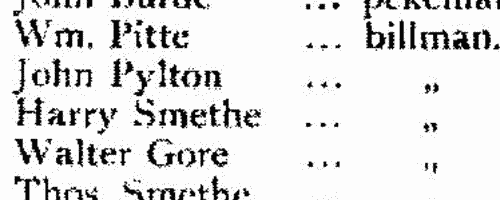
| Aliens in London (1571)
'The Reporte of the Searche of all the Straungers wythin London and Southwerk and the Liberties therof, made the xth daye of November, 1571'. The search found a total of 4,631 aliens living in the city, the great majority (3,643) being Dutch, 657 Frenchmen, 233 Italians &c. Arranged by parish and ward the report lists each householder by full name, where born, whether a denizen, (often) additional details, and how many aliens were in the household, and religion. This index includes also persons mentioned incidentally, such as employers. SP 12/82. Where there is a pair of scans for a single entry, the first gives the heading for the ward or parish.
| Sample scan, click to enlarge

| Official Papers
(1639)
The State Papers Domestic cover all manner of business relating to Britain, Ireland and the colonies, conducted in the office of the Secretary of State as well as other miscellaneous records.
| Sample scan, click to enlarge
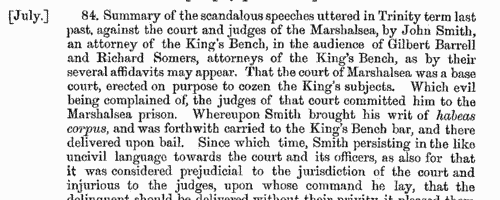
| Well-Affected Men of Kent
(1648)
After the capture of king Charles I by the forces of Parliament, this petition signed by over 1100 of 'the well affected in the county of Kent' was drawn up, calling on the Commons to prosecute his trial vigorously, and not to be satisfied with 'less than the blood of those persons, who have been the principall Authors' of the civil war; and also to transfer authority over all the militia in the country to 'his Excellency the Lord Fairfax'. Thomas Hearne the antiquary published a copy of the petition 'taken by no very skillfull scribe' in 1774, observing that such petitions were 'very diligently drawn up, not by the honest part, but by the very scum, of the Nation, signed generally by persons, in all respects, of an ordinary Reputation.' In this particular case, he noted, 'you'll scarce find one among them of any note or distinction.' | Sample scan, click to enlarge
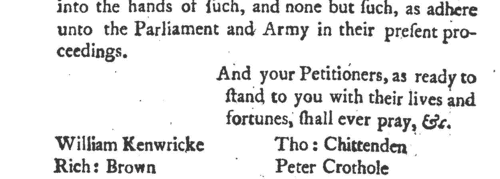
| PCC Probates and Administrations
(1649)
The Prerogative Court of Canterbury's main jurisdiction was central and southern England and Wales, as well as over sailors &c dying abroad: these brief abstracts, compiled under the title "Year Books of Probates", and printed in 1906, usually give address, date of probate and name of executor or administrator. They are based on the Probate Act Books, cross-checked with the original wills, from which additional details are, occasionally, added. The original spelling of surnames was retained, but christian and place names have been modernised where necessary. | Sample scan, click to enlarge
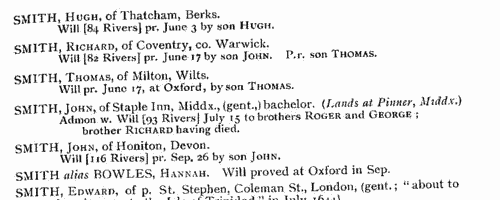
| London Marriage Allegations
(1611-1660)
London, Essex and part of Hertfordshire lay within the diocese of London. In the later 17th century the individual archdeaconry courts issued marriage licences, but for this period the only surviving material is from the overarching London Consistory court. The main series of marriage allegations from the consistory court was extracted by Colonel Joseph Lemuel Chester, and the text was edited by George J. Armytage and published by the Harleian Society in 1887. A typical later entry will give date; name, address and occupation of groom; name, address and condition of his intended bride, and/or, where she is a spinster, her father's name, address and occupation. Lastly we have the name of the church where the wedding was going to take place. For the later years Colonel Chester merely picked out items that he thought were of interest, and his selections continue as late as 1828, but the bulk of the licences abstracted here are from the 17th century. | Sample scan, click to enlarge

| Middlesex Sessions
(1625-1666)
Incidents from the Middlesex Sessions Books. These are abstracts of sessional orders, minutes of criminal cases, memoranda and other entries of record taken from the volumes of Gaol Delivery Register, Books and Rolls, Sessions of Peace Register, and Process Books of Indictments for the county of Middlesex from the death of king James I to the Great Fire of London. The references at the end of each item indicate the volume in question, the abbreviations being G. D. for Gaol Delivery, S. P. for Sessions of Peace, and S. O. T. for Session of Oyer and Terminer; occasionally preceded by S. for Special or G. for general, or followed by R. for Roll or Reg. for Register. It should be noted that, in the case of 'true bills' or indictments, the abstract starts with the date on which the offence took place, the date of the conviction &c. being at the end of the entry. These abstracts, prepared by John Cordy Jeaffreson for the Middlesex County Record Society, are far from being a complete calendar of these extensive records; his purpose was, in part, to notice 'every parchment that should exhibit a famous person's name or any other feature of personal interest'. | Sample scan, click to enlarge
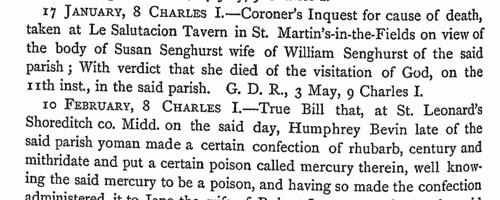
| Allegations for marriages in southern England
(1660-1679)
The province or archbishopric of Canterbury covered all England and Wales except for the northern counties in the four dioceses of the archbishopric of York (York, Durham, Chester and Carlisle). Marriage licences were generally issued by the local dioceses, but above them was the jurisdiction of the archbishop, exercised through his vicar-general. Where the prospective bride and groom were from different dioceses it would be expected that they obtain a licence from the archbishop; in practice, the archbishop residing at Lambeth, and the actual offices of the province being in London, which was itself split into myriad ecclesiastical jurisdictions, and spilled into adjoining dioceses, this facility was particularly resorted to by couples from London and the home counties, although there are quite a few entries referring to parties from further afield. The abstracts of the allegations given here usually state name, address (street in London, or parish), age, and condition of bride and groom; and sometimes the name, address and occupation of the friend or relative filing the allegation. Where parental consent was necessary, a mother's or father's name may be given. The ages shown should be treated with caution; ages above 21 tended to be reduced, doubtless for cosmetic reasons; ages under 21 tended to be increased, particularly to avoid requiring parental consent; a simple statement 'aged 21' may merely mean 'of full age' and indicate any age from 21 upwards. These are merely allegations to obtain licences; although nearly all will have resulted in the issuing of the licence, many licences did not then result in marriage. This index also includes marriage licence allegations for the jurisdiction of the Dean and Chapter of Westminster, 1558 to 1699. | Sample scan, click to enlarge

| House of Lords Proceedings
(1693-1695)
Private bills dealing with divorce, disputed and entailed estates: petitions, reports and commissions: naturalisation proceedings.
| Sample scan, click to enlarge
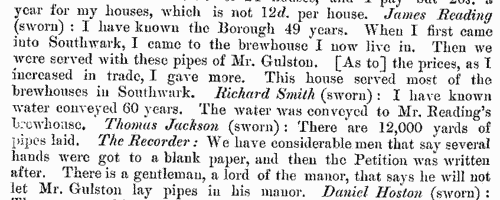
| House of Lords Proceedings
(1702-1704)
Private bills dealing with divorce, disputed and entailed estates: petitions, reports and commissions: naturalisation proceedings.
| Sample scan, click to enlarge
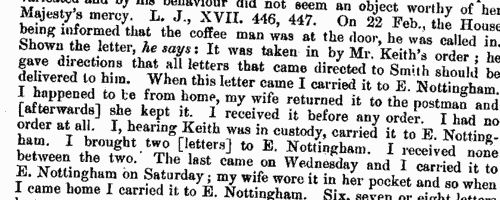
|
Research your ancestry, family history, genealogy and one-name study by direct access to original records and archives indexed by surname.
|











